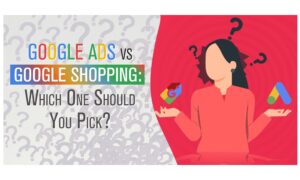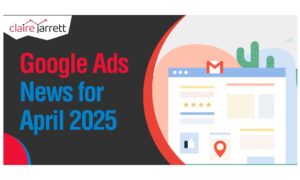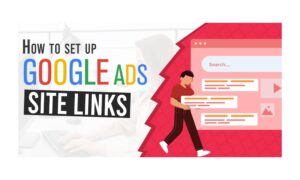The Role Of Keywords in Your Google Ads Campaigns
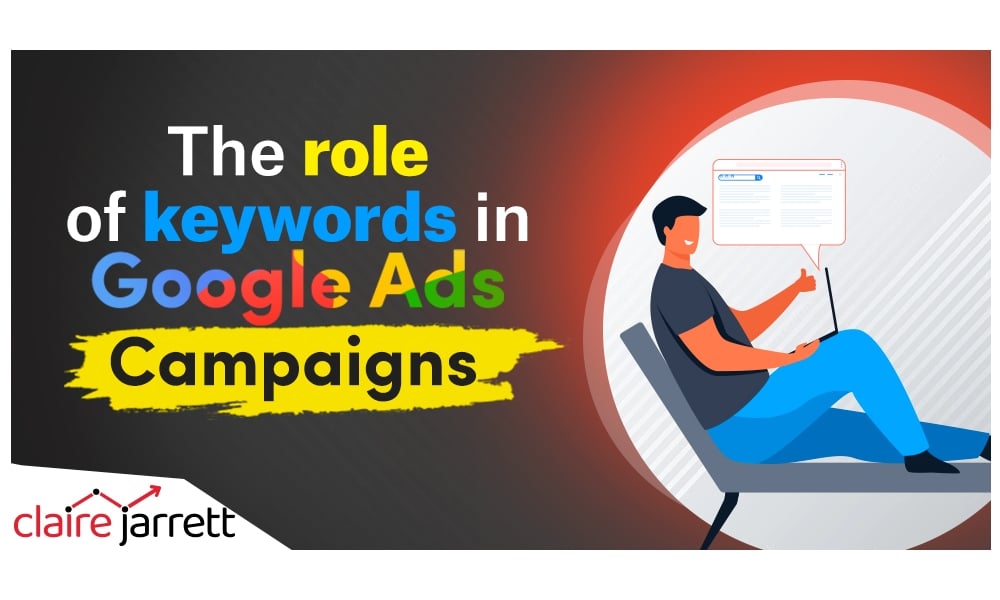
Last Updated on: 30th June 2025, 10:43 am
Want to know exactly how keywords work inside of your Google Ads campaigns? You are in the right place. In this guide we will be teaching you the 3 key roles to help you select better keywords and maximize the ROI from your campaigns.
Get ready because I’m about to show you everything I’ve learned after managing hundreds of google ads accounts over the past 15 years! Lets jump into it.
The 3 Key Roles of Keywords in Google Ads Campaigns
Keywords are foundational, but how does it work in practice?
Based on my experiences with hundreds of PPC consulting clients, I’ve found the following to be the best way to explain the exact role of keywords in Google AdWords campaigns:
- Keywords define the relevance of the rest of your campaign: ad copy, landing pages, and more.
- Keywords help you intercept the leads when they’re most likely to be interested in your offer.
- Google Ads keywords can be detailed, allowing you to cherry-pick the specific types of leads you’d like to attract to your business.
Here’s how all that works – with examples – to help you navigate the PPC world!
1. Google Ads Keywords Illustrate the Search Intent
Think of keywords as little flags. Whenever a searcher looks up a term – i.e., a keyword, they show you a little signal flag explaining what they want to accomplish with the search.
This can be anything from specific queries like: “best accounting services near me” to informational searches like: “what’s the best way to drive a manual transmission car?”
To you, the keywords they use in Google searches signal intent.
In Pay-Per-Click campaigns, keyword intent helps because it shows you which keywords to target if you want to get sales fast and which ones you should choose if you don’t mind educating your target audience before you pitch your solution.
Informational Google AdWords Keywords
Informational keywords are used by searchers looking for information on a particular topic or subject. They’re typically used in the early stages of the buyer’s journey when trying to learn more about a problem, product, or service.
For example, “How to prepare lasagna” or “Benefits of yoga for high blood pressure.”
When seasoned Google Ads experts look at an informational keyword, they immediately know what their campaigns should look like to have a high Quality Score.
We’ll either use landing pages with lead magnets that educate the audience or, for example, create a webinar series to collect signups and nurture the high-quality leads down the funnel, and generally orient our campaigns towards education instead of immediate conversions.
Navigational Keywords
When leads are looking for a specific website or brand, they’ll use navigational keywords. For example, “Facebook login” or “Asana.”
These can be helpful in branded search term campaigns.
For example, let’s say you own a project management tool.
If you’re new to the market, it may make sense to compete for keywords mentioning your bigger competitors, such as Monday or Asana, and then presenting your tool as an alternative with a relevant landing page that shows why you’re better than the competitor.
Firstly, you’ll appear when searchers are at the bottom of the funnel and ready to consider solutions. Secondly, you’ll be able to highlight why you’re different in the proper context.

Transactional Keywords
When your leads are ready to take action or purchase a solution, they’ll use transactional keywords. For example, “Buy Nike trainers online” or “Purchase a Lenovo laptop.”
These queries pop up at the bottom of the funnel, too, so leveraging them in your Google AdWords campaigns is a great way to generate faster conversions from higher-quality leads.
Going with our previous example, you could create a landing page dedicated to purchasing specific types of Nike trainers. Then, the keywords you target will ensure you appear in front of the purchase-ready leads.
The Role of Commercial Keywords in Google Ads Campaigns
When your leads are in the middle of the funnel, they’ll research potential solutions. (This is especially true in B2B, where 57-70% of your buyers will do their own research before contacting your sales team.)
That’s when they use the commercial investigation keywords. For example, they could search for “car insurance policy comparison” or “best hotels in Dubai.”
As a Google Ads coach, I love commercial keywords as much as transactional ones. They’re an excellent route for intercepting purchase-ready leads.
And depending on the level of detail, you can filter to find leads who will turn into repeat customers, which leads me to my next point…
2. Your Google Ads Keywords Allow You to Be Specific about Your Audience
You could be an accountant looking for more leads, but that doesn’t mean you should target broad keywords like “accounting services near me.”
Instead, think about who your ideal clients are: are they enterprises? Then, think about your specialisations.
For example, you could specialise in working with manufacturers, small businesses, freelancers, etc.
You would no longer target “accounting services near me.” Instead, your keywords would become more detailed:
- Enterprise accountants
- Best accountants for manufacturing companies
- Accredited manufacturing bookkeepers
When you use these long-tail keywords (3+ words in the keyphrase), you can narrow down your target audience and pinpoint your ideal buyers instead of casting a wide net and wasting your budget.
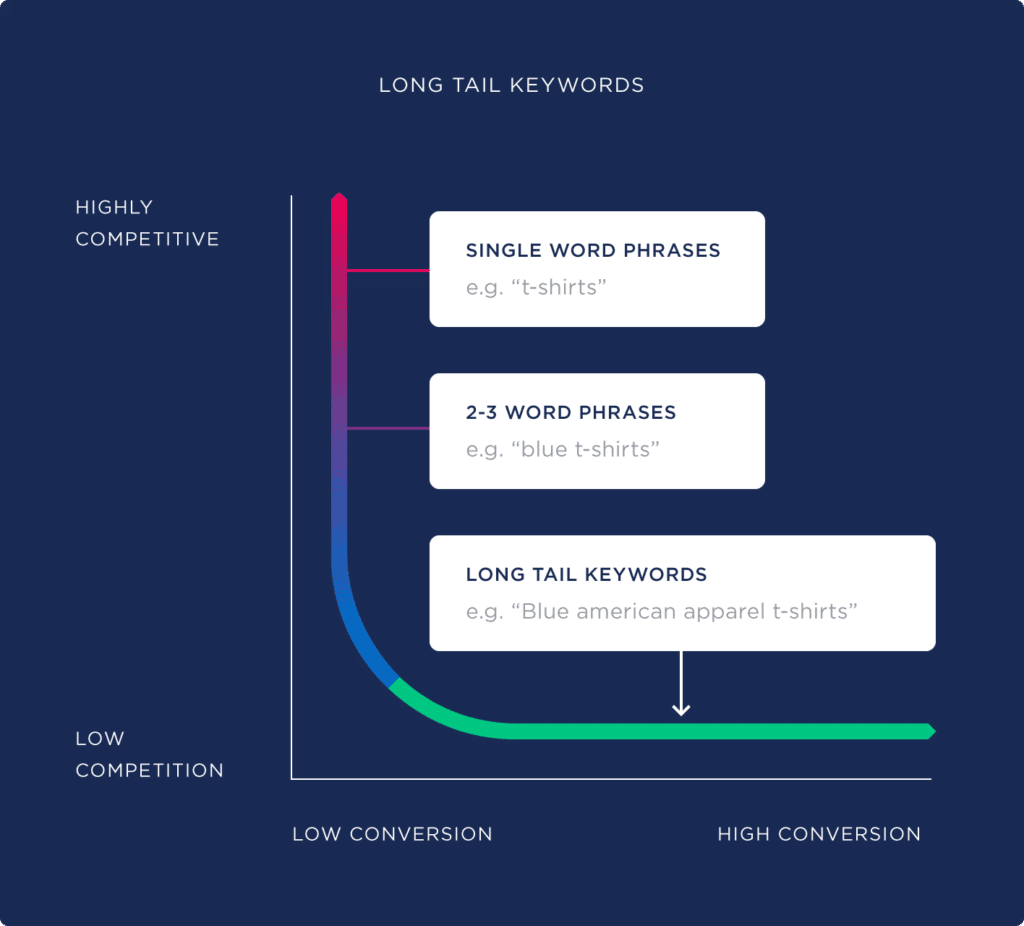
But Claire, Shouldn’t I Want to Cast a Wide Net?
No, you shouldn’t cast a wide net with your keywords. The more keywords you target with a single ad group or campaign, the harder it is to be relevant to that particular audience segment.
For example, enterprise clients have different needs than small businesses. If you have to create a single ad and landing page for both, you won’t meet any group’s needs in full.
Similarly, suppose you offer both CBT and psychoanalysis. In that case, you might want to have dedicated ads and landing pages for each of your therapy practice areas you want to advertise on Google Ads.
This directly affects your ad budget. The lower your Quality Score, the more you’ll pay for each click. The opposite is also true; your budget can go a long way if your ads have a high Quality Score.
Additionally, as a best practice, find all keywords that haven’t resulted in positive outcomes for you and add them to your negative keywords list. It’ll keep low-quality leads out of your funnel.
Be specific, and make sure your keyword match type reflects your strategy!
3. Keywords Are the Foundation of Your Google AdWords Campaign
Finally, keywords set the ground rules for your campaign relevance:
- Who will see your ads?
- What information do they need?
- What can you do to provide it?
Once you set your target keywords, Google will use them (and searchers’ associated search behaviour) to determine how relevant and, consequently, successful you are.
For example, if you’re a plumber and target the “emergency plumbing services in Bristol” keyword but fail to mention emergency services on your landing page, your Quality Score will decrease.
Conversely, suppose you target the “renovation plumbing in Bristol” keyword with a descriptive landing page, plenty of social proof, and practical examples.
In that case, searchers will be more likely to choose you over your competitors, increasing your Quality Score and decreasing your CPC.
What’s expressed in the search should always be reflected in the ad copy…
… and on the landing page:
The Keyword Recipe: Intent, Relevance, and Detail
Since keywords are vital to your Google Ads search campaigns, launch on the right note.
Understand who your ideal buyers are, what your areas of expertise are, and which searches your dream leads are most likely to perform when they’re ready to consider your solution.
From there, you’ll be well on your way to using Google Ads keywords like a pro!
If you need help with successfully launching your campaign, get your copy of my best-selling Google Ads book. You’ll learn how to do it in 7 rapid steps! Or, if you’re ready to scale your campaigns while optimising your costs, get in touch with me.





